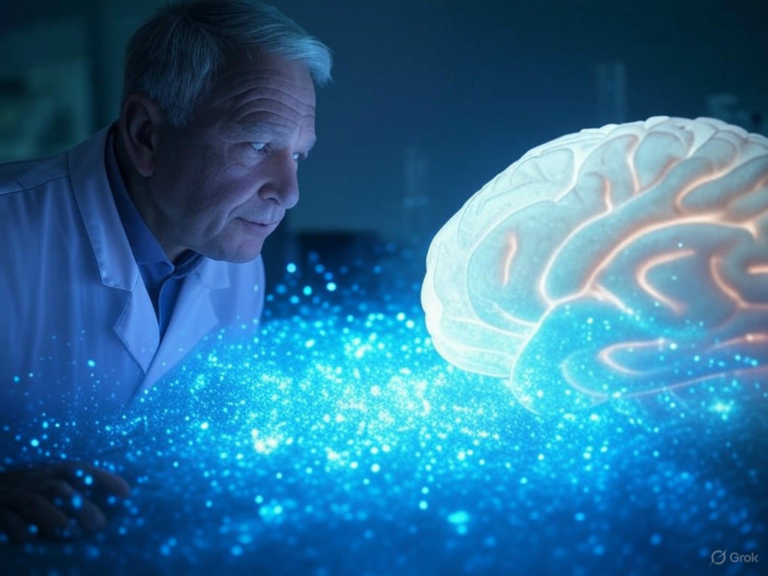
AI in Science and Medicine: Insights from the AI Index Report
Introduction to AI in Medicine
Have you ever wondered how AI in medicine is reshaping the way we approach health and science? The 2025 AI Index Report from the Stanford Institute for Human-Centered AI offers a fresh perspective on this transformation. It dives into groundbreaking developments, like enhanced protein modeling and faster drug discovery, showing how AI is not just supporting but accelerating innovations in diagnostics and biomedical research.
The Growing Impact of AI in Medicine
AI in medicine is now a cornerstone of scientific progress, moving from theoretical concepts to everyday applications. According to the latest AI Index Report, experts at Stanford’s HAI are tracking AI’s expansive role in areas like genomics, drug development, and public health. This isn’t just about tech—it’s about real-world changes that could save lives and streamline research.
- AI-driven breakthroughs are speeding up discoveries, with new tools emerging faster than ever before, as highlighted in the report.
- Many AI systems in medicine are matching or surpassing expert clinicians in key tasks, such as diagnosing diseases with impressive accuracy.
Imagine a world where AI helps predict outbreaks before they happen—what does that mean for global health? These advancements underscore why AI in medicine is essential for modern innovation.
Key Milestones in AI for Science and Medicine
Transforming Protein and Molecule Modeling with AI
In 2024, tools like ESM3 and AlphaFold 3 marked a significant leap in AI in medicine, particularly in structural biology. These models are boosting protein prediction accuracy, which could lead to better treatments for diseases. For instance, researchers are using them to design drugs more efficiently, cutting down what used to be years of work.
This progress isn’t just technical; it’s practical. Think about how a faster understanding of molecular structures could help in fighting cancers or rare genetic disorders—AI in medicine is making that possible.
Enhancing Drug Discovery Through AI in Medicine
Machine learning is revolutionizing drug discovery by sifting through vast datasets in genomics and proteomics. This approach identifies potential disease targets and refines drug candidates, slashing both time and costs in R&D. For example, AI algorithms can predict how a drug might interact with the body, helping prioritize the most promising options.
- Platforms for AI in medicine are streamlining pipelines, making the process more efficient and less error-prone.
- These tools even forecast side effects early, easing the path through regulatory hurdles.
If you’re in the pharmaceutical field, consider how integrating AI could transform your workflow—it’s not just about speed; it’s about smarter, more targeted innovation.
AI in Medicine for Clinical Decision Support
Models like OpenAI’s o1 are setting new records, scoring 96.0% on the MedQA benchmark, which tests clinical knowledge. What’s fascinating is how AI in medicine, such as GPT-4, is starting to outpace doctors in complex diagnoses, though the best results often come from teaming up human expertise with AI.
A quick example: In cancer detection, AI can spot patterns that might escape the human eye, but when doctors collaborate, accuracy soars. This synergy is why AI in medicine is evolving into a reliable partner rather than a replacement.
The Surge of AI-Enabled Medical Devices
The rise in AI in medicine is evident in the explosion of FDA-approved devices. From just one in 1995 to 223 by 2023, this growth reflects growing trust in these technologies for real clinical use. These devices are helping with everything from monitoring vital signs to advanced imaging.
| Year | FDA-Approved AI Devices |
|---|---|
| 1995 | 1 |
| 2015 | 6 |
| 2023 | 223 |
This trend raises an important question: How will AI in medicine continue to influence patient care in the coming years?
Synthetic Data and Personalized Approaches in AI for Medicine
AI in medicine is also leveraging synthetic data to protect privacy while improving predictions and drug searches. This data helps create tailored treatment plans based on individual patient profiles, making personalized medicine more accessible.
For healthcare providers, this means better risk assessments and customized therapies—imagine treating a patient with a plan as unique as their DNA.
Spotlight on Case Studies and Innovations in AI
Predicting Pandemics with AI in Medicine
Systems like EVEscape are using AI to forecast viral threats, allowing for quicker responses to health crises. This application of AI in medicine could have changed the course of recent pandemics by enabling early interventions.
AI’s Role in Environmental and Wildfire Monitoring
Beyond healthcare, models like FireSat show how AI in medicine’s principles extend to broader safety, predicting wildfires with high precision and linking back to public health impacts.
Optimizing Research with AI Tools
Innovations such as AlphaDev are fine-tuning algorithms for genomic research, demonstrating how AI in medicine supports foundational scientific tasks.
Balancing Benefits and Challenges in AI for Medicine
| Benefits of AI in Medicine | Key Challenges |
|---|---|
|
|
While the advantages are clear, addressing these challenges is crucial for the sustainable growth of AI in medicine. What steps can we take to make sure these tools are both effective and ethical?
Navigating Ethics and Regulation in AI for Medicine
As AI in medicine expands, ethical discussions are intensifying. Publications on the topic have surged, emphasizing the need for transparency and bias reduction. Policymakers and clinicians must work together to build safeguards that promote trust.
For example, ensuring AI algorithms are fair across diverse populations could prevent disparities in care—it’s about creating systems that serve everyone equally.
What Makes This Era of AI in Medicine Unique?
The 2025 AI Index Report shifts focus from individual wins to a comprehensive overview, where AI in medicine is routinely outperforming experts in diagnostics and driving device approvals.
- AI is proving its worth in medical tasks, often enhancing human efforts.
- Collaborative models are leading to superior patient results.
- The ecosystem of AI tools is expanding rapidly.
The Future Outlook for AI in Medicine
Looking ahead, investments in AI in medicine promise even more advanced models and stronger regulations. The goal is to integrate these technologies seamlessly into healthcare, focusing on explainability and trust.
If you’re passionate about this field, staying updated could open doors to exciting opportunities—perhaps even contributing to the next big breakthrough.
Wrapping Up Insights on AI in Medicine
AI in medicine is unlocking new possibilities in science and healthcare, as detailed in the 2025 AI Index Report. From ethical considerations to real-world applications, it’s a field full of potential and pitfalls. We’d love to hear your thoughts—share your experiences or questions in the comments below.
Ready to dive deeper? Check out our related posts on emerging tech trends or explore how AI is changing other industries.
Frequently Asked Questions
- What is the MedQA benchmark? It’s a test for AI in medicine that measures how well models handle clinical reasoning, with recent scores showing remarkable progress.
- Are AI medical devices safe? Yes, with the rise in approvals, but continuous oversight ensures they meet safety standards.
- How does AI improve drug discovery? By analyzing data to spot targets and predict outcomes, AI in medicine speeds up the process and reduces risks.
References
- Stanford AI Index. (2024). HAI AI Index Report 2024 Chapter 5. Retrieved from https://aiindex.stanford.edu/wp-content/uploads/2024/04/HAI_AI-Index-Report-2024_Chapter5.pdf
- Stanford Medicine. (2025). AI Index Report on Science and Medicine. Retrieved from https://med.stanford.edu/news/all-news/2025/04/ai-index-report-science-medicine.html
- Stanford HAI. (2025). AI Index Report 2025. Retrieved from https://hai.stanford.edu/ai-index/2025-ai-index-report
- Stanford HAI. (2025). Science and Medicine Section. Retrieved from https://hai.stanford.edu/ai-index/2025-ai-index-report/science-and-medicine
- Stanford HAI. (2024). HAI AI Index Report 2024. Retrieved from https://hai-production.s3.amazonaws.com/files/hai_ai-index-report-2024-smaller2.pdf
- NCBI PMC. (2023). Article on AI in Drug Discovery. Retrieved from https://pmc.ncbi.nlm.nih.gov/articles/PMC10385763/
- Stanford HAI. (2025). Full AI Index Report 2025. Retrieved from https://hai-production.s3.amazonaws.com/files/hai_ai_index_report_2025.pdf
- eContent Pro. (n.d.). Blog on AI Topics. Retrieved from https://www.econtentpro.com/blog
AI in medicine, AI in science, AI Index Report, biomedical AI, drug discovery, AI medical devices, personalized medicine, AI diagnostics, healthcare innovation, AI ethics







